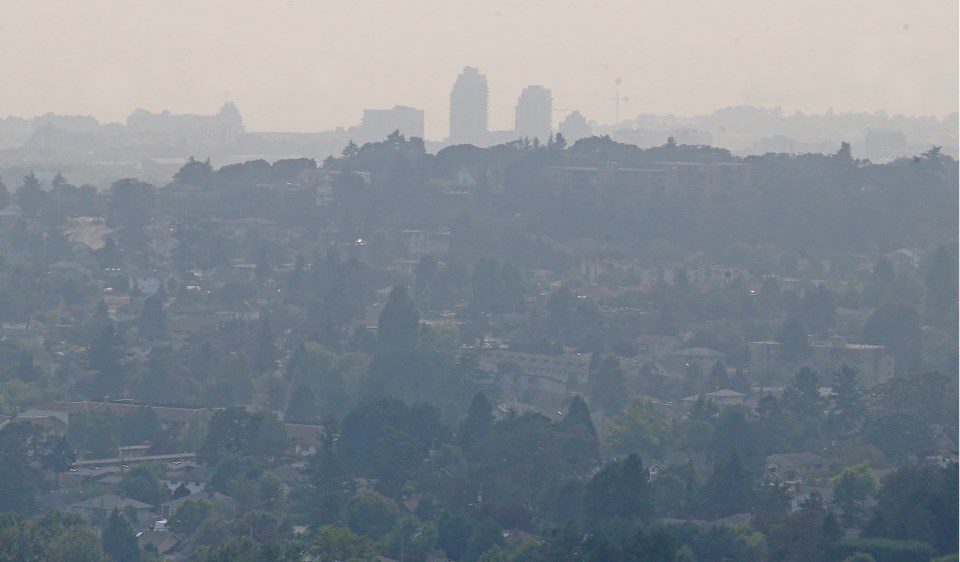A smoky haze settled over Greater Victoria Tuesday as wildfires and a worsening drought continued to plague Vancouver Island.
The deteriorating air quality caused by the fires prompted public health officials to urge precautions for young children, seniors and people with underlying medical conditions aggravated by inhaling too much smoke.
Dr. Murray Fyfe, a medical health officer with Island Health, said vulnerable people should avoid strenous activity outdoors; stay inside unless they have to go out; consider using a HEPA filter to improve air quality; and eliminate indoor pollution caused by smoking cigarettes or frying food.
In vehicles, he advised people to keep the windows up and the air conditioning on recirculate to prevent drawing air from the outside.
Fyfe added that people with heart or lung conditions should follow their disease management plans if they have one.
“If they’re asthmatic, for example, they may have a plan that tells them what to do in certain situations when they’re exposed to smoke or pollens or things that are going to exacerbate their asthma.”
Everyone else, he said, should use their common sense.
“Don’t try to do anythig too strenous right now, especially if it’s very smoky, because you may find that you develop symptoms even if you don’t have an underlying health condition,” he said.
Fyfe said it’s too soon to say whether the smoke will trigger more hospital visits on the Island. “Often it takes a couple of days after exposure like this before you start to see an increae in people going to the emergency department.”
The air quality index on Tuesday showed a moderate risk for Victoria, Saanich, and the West Shore. But that could worsen with wildfires burning out of control over much of the province and little relief in sight.
The persistent hot, dry weather has prompted the provincial government to increase the drought rating for eastern Vancouver Island to its highest level.
Officials warned they may be forced to regulate water use and temporarily suspend water licences if conditions deteriorate or people fail to rein in their usage.
A number of streams and rivers — including the Koksilah, Chemainus, San Juan and Salmon — are at or near record-low flows.
“It’s starting to get to an acute situation in some streams,”said Valerie Cameron of the Ministry of Forests, Lands, Natural Resource Operations and Rural Development.
“We really haven’t had any substantial rain at all for a month and a half. The little bit of rain we got this last weekend really didn’t do anything.
“So that’s really starting to cause problems — particularly for fish and aquatic ecosystems. They’re struggling. The temperatures are going up in some of those streams and some of the streams are being heavily used for irrigation and agriculture and it’s starting to cause some problems.”
The Koksilah and Chemainus rivers are among the hardest hit, she said.
“They’re extremely low and they’re heavily used so we’re asking people, ‘Please, voluntarily cut back on your water usage,’ ” she said. “If the voluntary conservation works, we’re hoping not to regulate. But, if we have to regulate, we will and we’re preparing to do so if we need to.”
People in major centres are asked to obey their local water bylaws, while those outside urban areas who draw their water directly from streams, lakes or groundwater wells are urged to cut back their use as much as possible.
“As long as people are willing to conserve water, they can stretch out the water supplies that they’ve got,” Cameron said.
Greater Victoria is in better shape than other parts of the Island because of the Sooke reservoir, which was 77 per cent full on Tuesday. Stage 1 water conservation is in effect, which restricts lawn watering for even-numbered addresses to Wednesdays and Saturdays, and odd addresses to Thursdays and Sundays. Watering is allowed on those days 4 a.m. to 10 a.m. and 7 p.m. to 10 p.m.



